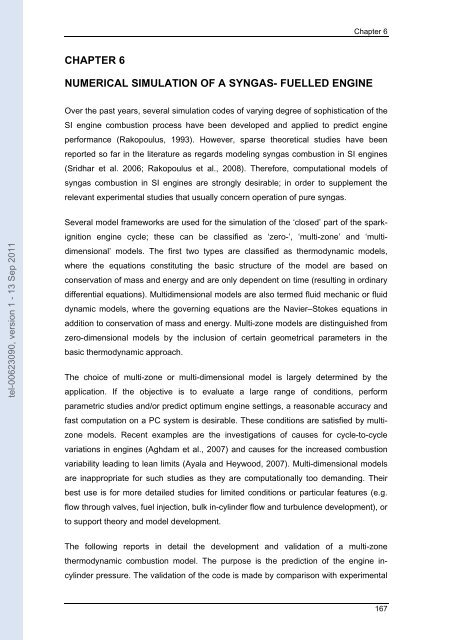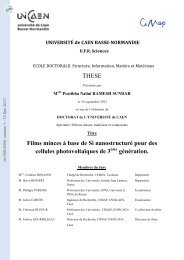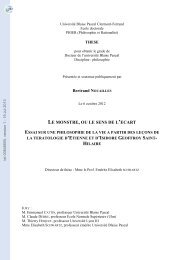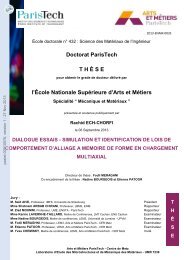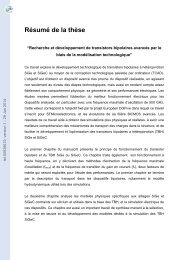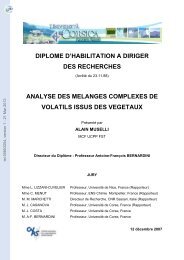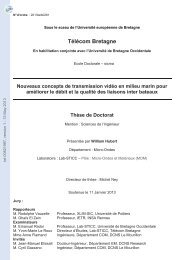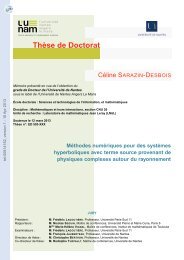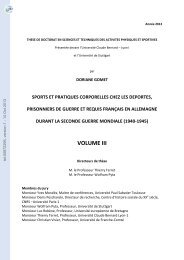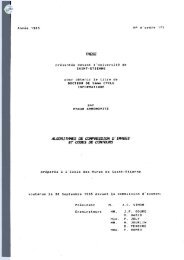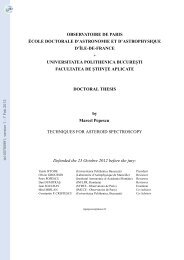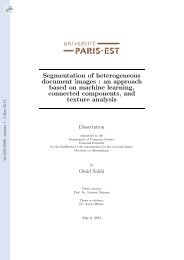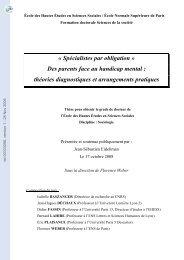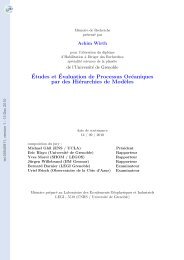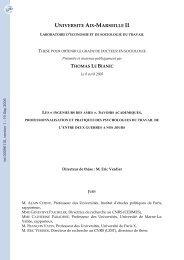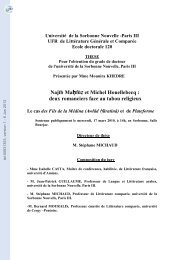Etude de la combustion de gaz de synthèse issus d'un processus de ...
Etude de la combustion de gaz de synthèse issus d'un processus de ...
Etude de la combustion de gaz de synthèse issus d'un processus de ...
Create successful ePaper yourself
Turn your PDF publications into a flip-book with our unique Google optimized e-Paper software.
Chapter 6<br />
CHAPTER 6<br />
NUMERICAL SIMULATION OF A SYNGAS- FUELLED ENGINE<br />
Over the past years, several simu<strong>la</strong>tion co<strong>de</strong>s of varying <strong>de</strong>gree of sophistication of the<br />
SI engine <strong>combustion</strong> process have been <strong>de</strong>veloped and applied to predict engine<br />
performance (Rakopoulus, 1993). However, sparse theoretical studies have been<br />
reported so far in the literature as regards mo<strong>de</strong>ling syngas <strong>combustion</strong> in SI engines<br />
(Sridhar et al. 2006; Rakopoulus et al., 2008). Therefore, computational mo<strong>de</strong>ls of<br />
syngas <strong>combustion</strong> in SI engines are strongly <strong>de</strong>sirable; in or<strong>de</strong>r to supplement the<br />
relevant experimental studies that usually concern operation of pure syngas.<br />
tel-00623090, version 1 - 13 Sep 2011<br />
Several mo<strong>de</strong>l frameworks are used for the simu<strong>la</strong>tion of the ‘closed’ part of the sparkignition<br />
engine cycle; these can be c<strong>la</strong>ssified as ‘zero-’, ‘multi-zone’ and ‘multidimensional’<br />
mo<strong>de</strong>ls. The first two types are c<strong>la</strong>ssified as thermodynamic mo<strong>de</strong>ls,<br />
where the equations constituting the basic structure of the mo<strong>de</strong>l are based on<br />
conservation of mass and energy and are only <strong>de</strong>pen<strong>de</strong>nt on time (resulting in ordinary<br />
differential equations). Multidimensional mo<strong>de</strong>ls are also termed fluid mechanic or fluid<br />
dynamic mo<strong>de</strong>ls, where the governing equations are the Navier–Stokes equations in<br />
addition to conservation of mass and energy. Multi-zone mo<strong>de</strong>ls are distinguished from<br />
zero-dimensional mo<strong>de</strong>ls by the inclusion of certain geometrical parameters in the<br />
basic thermodynamic approach.<br />
The choice of multi-zone or multi-dimensional mo<strong>de</strong>l is <strong>la</strong>rgely <strong>de</strong>termined by the<br />
application. If the objective is to evaluate a <strong>la</strong>rge range of conditions, perform<br />
parametric studies and/or predict optimum engine settings, a reasonable accuracy and<br />
fast computation on a PC system is <strong>de</strong>sirable. These conditions are satisfied by multizone<br />
mo<strong>de</strong>ls. Recent examples are the investigations of causes for cycle-to-cycle<br />
variations in engines (Aghdam et al., 2007) and causes for the increased <strong>combustion</strong><br />
variability leading to lean limits (Aya<strong>la</strong> and Heywood, 2007). Multi-dimensional mo<strong>de</strong>ls<br />
are inappropriate for such studies as they are computationally too <strong>de</strong>manding. Their<br />
best use is for more <strong>de</strong>tailed studies for limited conditions or particu<strong>la</strong>r features (e.g.<br />
flow through valves, fuel injection, bulk in-cylin<strong>de</strong>r flow and turbulence <strong>de</strong>velopment), or<br />
to support theory and mo<strong>de</strong>l <strong>de</strong>velopment.<br />
The following reports in <strong>de</strong>tail the <strong>de</strong>velopment and validation of a multi-zone<br />
thermodynamic <strong>combustion</strong> mo<strong>de</strong>l. The purpose is the prediction of the engine incylin<strong>de</strong>r<br />
pressure. The validation of the co<strong>de</strong> is ma<strong>de</strong> by comparison with experimental<br />
167


